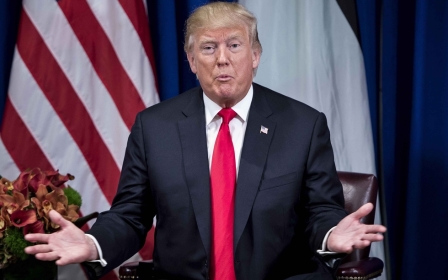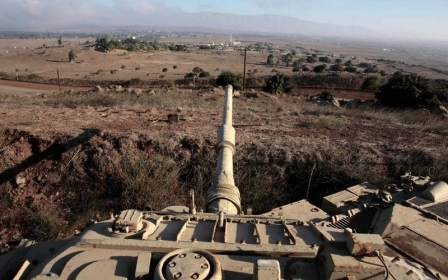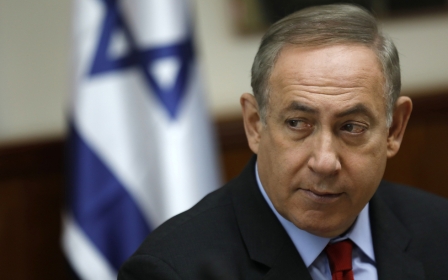US gives nod to Israel targeting of Iranian military chief in Syria: Report

The US has given Israel the green light to assassinate General Qassem Soleimani, commander of an elite Iranian military unit and mastermind behind Tehran's military operations across the Middle East, Kuwaiti newspaper Al-Jarida reported on Monday.
Al-Jarida quoted an unnamed source in Jerusalem who said that the two allies have made a quiet agreement after deciding that Soleimani is a “threat to the two countries’ interests in the region".
According to the same source, the Americans thwarted an Israeli attempt to kill Soleimani three years ago near Damascus, warning the Iranians about the plan.
That incident "sparked a sharp disagreement between the Israeli and American security and intelligence apparatuses".
Israeli daily Haaretz has described Al-Jarida as an Israeli mouthpiece.
Mahan Abedin, an analyst of Iranian politics, told MEE that the "deal appears to make sense" if seen within a context of increased American aggression toward Iran and Israel's willingness "to go after Iranian assets".
"Even before Trump’s arrival, the CIA has become a lot more aggressive towards Iran and have gone as far as to appoint Mike D'Andrea - dubbed 'Ayatollah Mike' - who has form in having an aggressive attitude toward Iran, to head their Iran department.
"The problem they have is that they don’t have a good record at penetrating Iranian state structures," Abedin added.
"The Israelis, on the other hand, are prepared to do things Americans aren't prepared to do," Abedin said, referring to the assassinations of a number of Iranian nuclear scientists in Iran, and Iranian military figures abroad, allegedly by Israel.
"It doesn’t surprise me the Israelis planned to assassinate Soleimani three years ago and are prepared to do so now."
The Al-Jarida report also claimed to identify, for the first time, Iran's number two in Syria after Soleimani, as Mohammad Reza Falahzadeh, nicknamed "Abu Bakr".
Falahzadeh, a military commander, has been given wide powers to operate in Syria and also joined the Iranian delegation at the Astana conference aimed at settling the Syrian conflict, according to the report.
The revelation of Falahzadeh's identity will present a breakthrough for Syrian opposition forces which are interested in targeting Iran's chain of command in Syria.
Since 2015, there have been several reports that Soleimani was wounded in Syria, though these have never been confirmed by Iran.
He is thought to be behind the Syrian government's resurgence during the siege of Aleppo and had been a point man for the Russian-Iranian axis that has turned the war in Syrian leader Bashar al-Assad’s favour.
Several weeks ago, CIA chief Mike Pompeo said that he had written to Soleimani over fears that Iranian forces might attack American troops in Iraq. He didn't specify when he sent the letter.
“What we were communicating to him in that letter was that we will hold he and Iran accountable for any attacks on American interests in Iraq by forces that are under their control,” Pompeo said during a discussion at the annual Reagan National Defence Forum in southern California.
Al-Jarida's report comes days after Israeli Channel 10 news reported that Israel and the US had signed a cooperation agreement on how to deal with Iran.
US national security adviser HR McMaster and his Israeli counterpart, Meir Ben-Shabbat, reportedly led negotiations that ended in the 12 December agreement signed at the White House.
According to Channel 10, the agreement will translate Trump's decertification of the Iranian nuclear deal into action by appointing three working groups.
One group will be responsible for countering Iran's nuclear programme, another will aim to check Tehran's influence in the region - most notably its links with Hezbollah - and the third will focus on Tehran's expanding ballistic missile programme.
Trump, who has repeatedly voiced his disapproval of the landmark 2015 nuclear deal, fell short of scrapping it in October, leaving its fate for Congress to decide. But he warned that he was launching a new strategy to deal with Iran’s “fanatical regime".
“We will not continue down a path whose predictable conclusion is more violence, more terror and the very real threat of Iran’s nuclear breakout,” Trump said in October.
Israeli Prime Minister Benjamin Netanyahu has long been an opponent of the deal even before it was ratified and had unsuccessfully lobbied then US president Barack Obama to stop it being passed.
The Israeli ministry of foreign affairs and the US State Department have not responded to questions at the time of publication.
New MEE newsletter: Jerusalem Dispatch
Sign up to get the latest insights and analysis on Israel-Palestine, alongside Turkey Unpacked and other MEE newsletters
Middle East Eye delivers independent and unrivalled coverage and analysis of the Middle East, North Africa and beyond. To learn more about republishing this content and the associated fees, please fill out this form. More about MEE can be found here.




